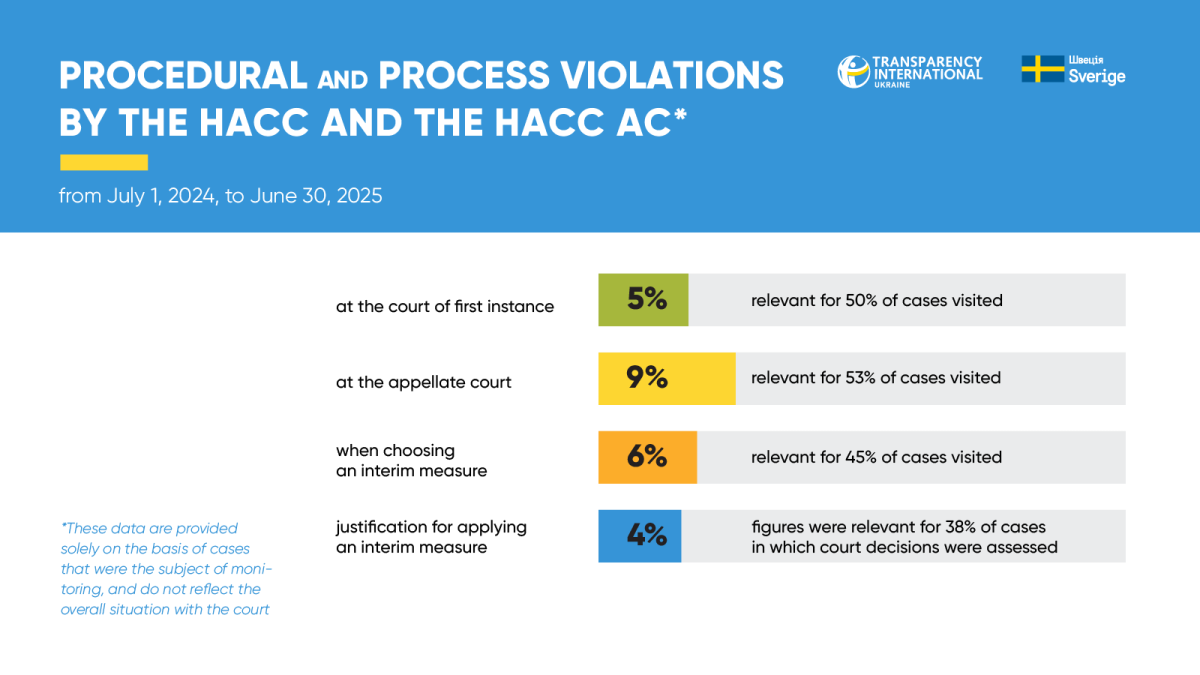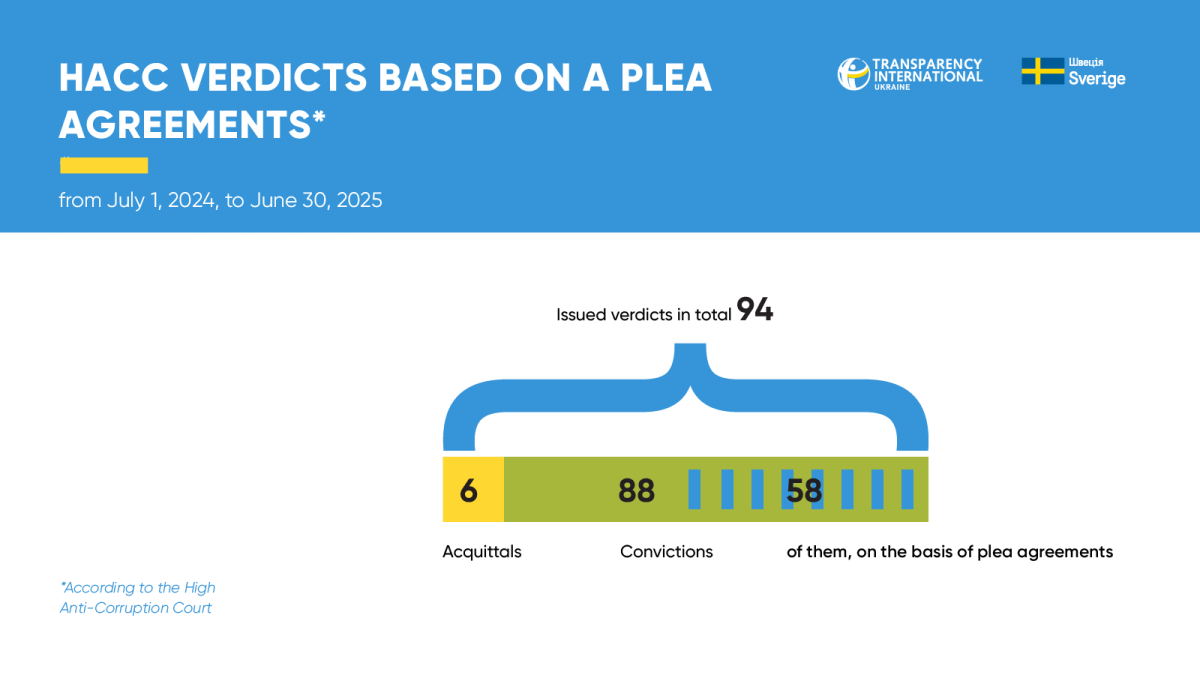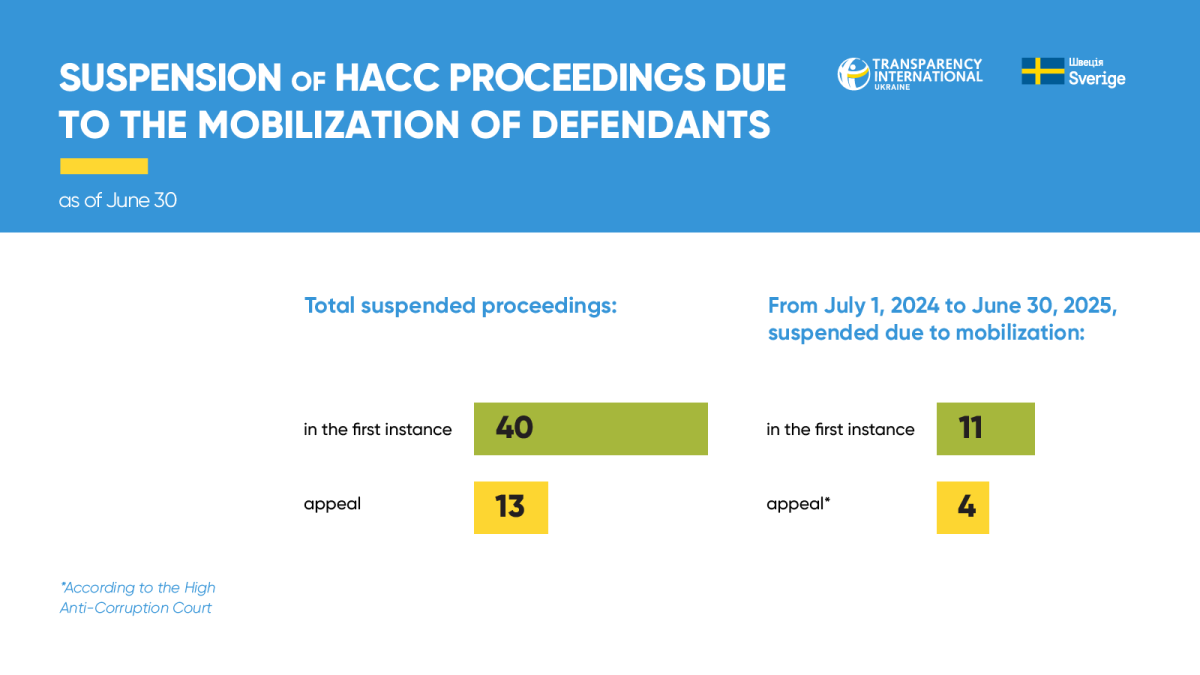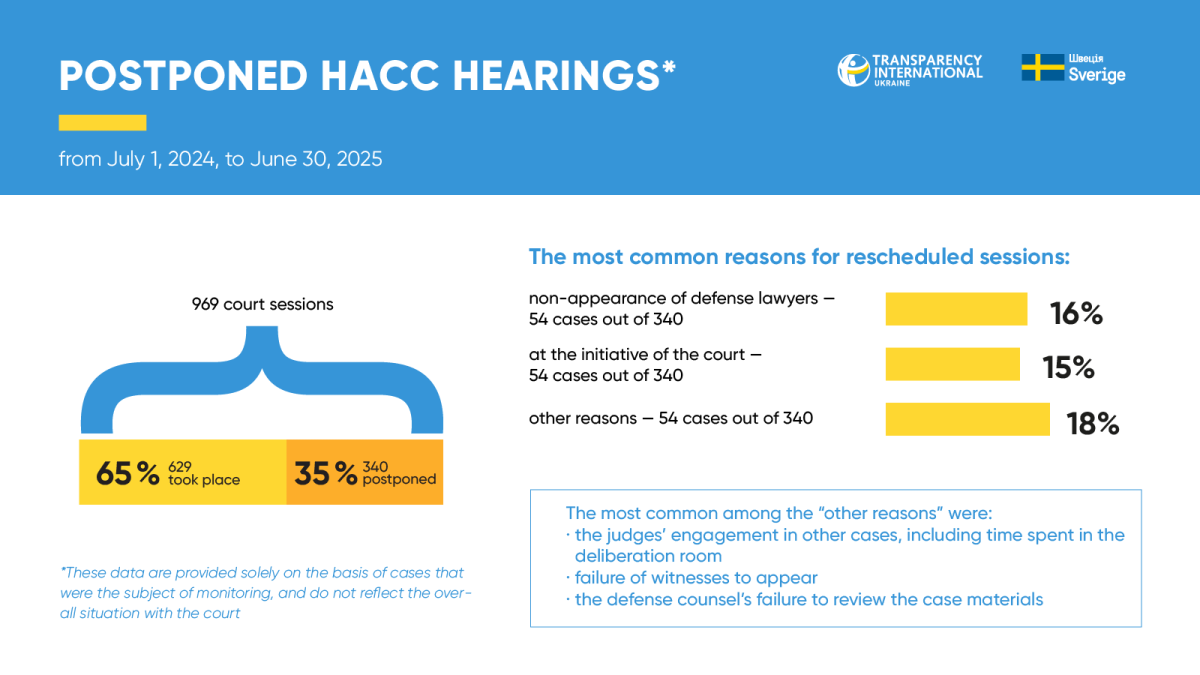

Since the establishment of the High Anti-Corruption Court (HACC) in 2019, Transparency International Ukraine has been systematically monitoring its activities, studying both judicial practice and organizational aspects of its work. Over six years of operation, the HACC has proven its effectiveness as a key element of Ukraine’s anti-corruption infrastructure. However, the institution now faces serious challenges related to its role within the system of criminal justice specializing in corruption cases.
This report presents the results of the sixth stage of monitoring HACC’s performance and continues the series of analytical materials covering the period since July 2020. The current stage of monitoring took place amid increased pressure on Ukraine’s anti-corruption institutions.
The current stage of monitoring took place amid increased pressure on Ukraine’s anti-corruption institutions.
Context
On July 22, 2025, Parliament adopted Law No. 4555-IX, which effectively dismantled the independence of the NABU and the SAPO. Under this law, the Prosecutor General was granted the authority to notify top state officials of suspicion, request any materials from the NABU, transfer its cases to other investigative bodies, and unilaterally close proceedings against high-level corruption suspects. At the same time, the Head of the SAPO lost procedural independence and the ability to determine NABU’s exclusive jurisdiction over certain cases.
Although just over a week later, Law No. 4560-IX reinstated the previous provisions ensuring NABU and SAPO’s independence, the government still retains levers of influence over anti-corruption bodies. Moreover, these legislative changes unfolded against a backdrop of systematic information attacks on such institutions.
As noted by the HACC Chair, such campaigns bear the hallmarks of orchestrated disinformation intended to discredit institutions and undermine public trust. During the monitoring period, the HACC also faced direct manifestations of pressure – from the discovery of wiretapping equipment in employees’ homes to unacceptable public statements by law enforcement agencies directed at judges.
In this context, our report has a dual purpose. First, to objectively assess HACC’s performance and identify areas for improvement. Second, to clearly outline spheres of responsibility for existing challenges — distinguishing problems requiring legislative framework from those that can be resolved through improvements in the court’s internal procedures.
This report not only documents the current state of affairs but also highlights progress made since the previous monitoring stage. It also provides specific recommendations whose implementation would strengthen HACC’s institutional capacity in the face of emerging challenges.
Our report has a dual purpose. First, to objectively assess HACC’s performance and identify areas for improvement. Second, to clearly outline spheres of responsibility for existing challenges — distinguishing problems requiring legislative framework from those that can be resolved through improvements in the court’s internal procedures.
Features of the sixth monitoring period
During the reporting period, our experts attended 969 court hearings, analyzed hundreds of judicial decisions, and examined key trends in the court’s work. We focused on assessing procedural effectiveness, compliance with criminal procedure standards, and the implementation of recommendations from previous monitoring stages.
The findings indicate that, despite external pressure, the HACC continues to adhere to high professional standards. At the same time, systemic problems remain unresolved. Some can only be addressed through legislative amendments, while others require refinement of judicial practice.
One of the most pressing challenges for HACC proceedings remains the ineffective regulation of statutes of limitations. Because of this, the actions of certain corruption suspects are left without proper judicial assessment. Once the limitation period expires, cases are closed and defendants are released from criminal liability, leaving unresolved the key question of whether they in fact committed a criminal offense. Combined with procedural difficulties during investigation and trial, such case closures are particularly damaging for the prosecution of corruption.
At a time when the independence of anti-corruption justice is under systematic attack, it is crucial to preserve objective analysis of the Court’s work and continue supporting HACC’s institutional development to ensure justice and strengthen the fight against corruption in Ukraine.
One of the most pressing challenges for HACC proceedings remains the ineffective regulation of statutes of limitations. Because of this, the actions of certain corruption suspects are left without proper judicial assessment.
Summary
The sixth report on monitoring the work of the HACC covers the period from July 1, 2024 to June 30, 2025 — a time of unprecedented challenges for the independence of anti-corruption justice. On July 22, 2025, Parliament adopted a law that effectively dismantled the independence of the NABU and the SAPO, although its provisions were later repealed.
Amid systematic information attacks and direct pressure on judges, the HACC continued to demonstrate high professional standards, while also encountering systemic problems.
Key achievements
Growing number of cases adjudicated. The HACC shows a stable upward trajectory: the number of cases resolved increased from 55–60 in 2019–2020 to 84–88 in 2023–2024. Notably, the number of convicted individuals rose from 49 in 2022 to 112 in 2024, reflecting the conclusion of proceedings involving a larger number of defendants.
Improvement of the plea bargain mechanism. Since November 2024, new rules on plea agreements have shown a positive effect: 66% of convictions were based on such agreements, UAH 87 million in damages was reimbursed, an additional UAH 97 million and six vehicles were transferred to defense needs. In total, more than UAH 250 million was returned to the state.
Resolving the issue of mobilized corruption defendants. The adoption of Law No. 4496-IX addressed the problem of delays caused by the mobilization of defendants in corruption cases by establishing clear criteria for suspending trials.
Critical challenges
Ineffective regulation of statutes of limitations remains the biggest systemic problem. During the reporting period, 13 individuals were released from criminal liability due to the expiration of limitation periods (five by the HACC and eight by the HACC Appeals Chamber). Our estimates indicate that at least 26 cases could be closed on this basis over the next three years.
Abuse of procedural rights is taking new forms and expanding. In one case, during September 2024 alone, a defense attorney filed 1,426 complaints against alleged inaction by the NABU and the SAPO to the investigating judge, and later, within four days of October, submitted 2,852 appeals against the investigating judge’s ruling in a consolidated proceeding. Overall, during the reporting period the HACC issued 24 rulings on disciplinary liability of attorneys, yet the Qualifications and Disciplinary Bar Commissions (QDBCs) responded insufficiently effectively.
The problem of corruption suspects absconding has intensified — in 13.7% of cases, special proceedings are conducted in absentia. A critical challenge is the shortage of electronic bracelets (only 145 for the whole of Ukraine), along with probable misconduct by public officials facilitating unlawful border crossings.
Recommendations
To Parliament:
- Comprehensively improve legislation on statutes of limitations: establish additional grounds for suspension, extend their duration, and change the endpoint of calculation.
- Introduce mechanisms to counter abuses of procedural rights, including financial penalties.
- Abolish automatic closure of cases due to the expiration of the pre-trial investigation period.
- Determine that the consent of parties is not required to continue proceedings when a judge is replaced.
- Review the provisions on single-judge trials and extend them to civil confiscation cases.
- Provide for mandatory special confiscation when approving plea agreements.
To HACC:
- Ensure thorough and well-grounded verification of damage compensation amounts in plea agreements, and avoid approving them without due assessment of public interest.
- Consistently and systematically exercise presiding judges’ powers to manage proceedings and stop abuses of procedural rights.
To the Government: ensure a sufficient supply of electronic bracelets and take measures to prevent corruption defendants from absconding.
Implementation of these recommendations would strengthen the institutional capacity of the court and increase the effectiveness of anti-corruption efforts.
This report was prepared by Transparency International Ukraine with the financial support of Sweden.
Amid systematic information attacks and direct pressure on judges, the HACC continued to demonstrate high professional standards, while also encountering systemic problems.










